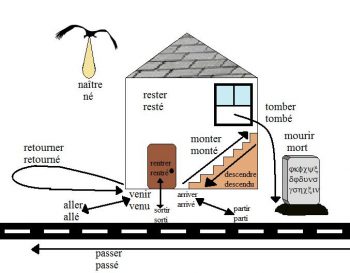French Grammar – Putting an addition on the “the house of être” Posted by Tim Hildreth on Dec 5, 2017 in Grammar, Vocabulary
êFrench uses helping verbs to form the past tense form known as the passé compose (the composed past)*. Most verbs use avoir as their helping verb while a select group though use être. While this rule is generally true, there is a special case when even verbs that usually take avoir use être to form the past tense.

There are different tricks for remembering which verbs – all of which relate to movement or a change of state/place – always use être. For some, Dr. & Mrs. Van der Tramp do the trick. For others the “house of être” helps.
In any case, all verbs that use être start the passé compose in the same way:
| Je suis … | Nous sommes … |
| Tu es … | Vous êtes … |
| Il/elle/on est … | Ils/elles sont … |
Je suis allé au cinéma ce week-end**. / I went to the movies this weekend.
Vous êtes restés*** à la maison. / You stayed home.
Elles sont arrivées de Nice hier matin. / They arrived from Nice yesterday morning.
All the other verbs, as noted, use avoir. They start:
| J’ai … | Nous avons … |
| Tu as … | Vous avez … |
| Il/elle/on a … | Ils/elles ont … |
Tu as acheté une nouvelle voiture ? / You bought a new car ?
Il a déjà vu le film plusieurs fois. / He already saw the movie a number of times.
Nous avons mangé au restaurant ensemble pour l’anniversaire de Pierre. / We ate at the restaurant together for Peter’s birthday.
The exception to this hard and fast rule of verb use comes in with reflexive or pronominal verbs. These verbs which relate to actions that one takes on oneself (verbs that are, in other words, self-reflective), like verbs in the House of être, also use the verb être when forming the passé composé. You may have noticed two of them last week in my post about naps.
So for example, while you would say J’ai lavé ma nouvelle voiture hier. / I washed my new car yesterday. You would say Je me suis lavé les**** mains avant de manger. / I washed my hands before eating. Or Le film hier soir m’a beaucoup amusé. / The film last night really amused me. But Je me suis bien amusé(e)***** au cinéma hier. / I had a fun time at the movies yesterday.
* There is another French past tense form known as le passé simple. Rarely used today in spoken French, you will often encounter it in written text, especially novels and other types of stories like in this post from my fellow blogger Elizabeth Schermund.
** Note that according the new rules of spelling in French you no longer need to include the hyphen in week-end. It’s a habit I’m afraid I just can’t bring myself to break.
*** Remember that in the passé composé, verbs conjugated with etre need to agree in gender and number with the subject of the sentence. In this example, vous is plural
**** Remember that when you’re talking about parts of your own body, you generally use the definite article instead of a possessive adjective.
***** Since I am male, je me suis amusé is the correct form. If I were female, je me suis amusée would be correct.
Image Copyright: By TomasBat – Microsoft Paint, CC BY 3.0, https://commons.wikimedia.org/w/index.php?curid=3921996

Build vocabulary, practice pronunciation, and more with Transparent Language Online. Available anytime, anywhere, on any device.



